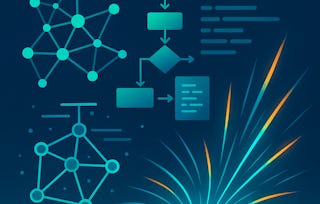This course is for novice programmers or business people who would like to understand the core tools used to wrangle and analyze big data. With no prior experience, you will have the opportunity to walk through hands-on examples with Hadoop and Spark frameworks, two of the most common in the industry. You will be comfortable explaining the specific components and basic processes of the Hadoop architecture, software stack, and execution environment. In the assignments you will be guided in how data scientists apply the important concepts and techniques such as Map-Reduce that are used to solve fundamental problems in big data. You'll feel empowered to have conversations about big data and the data analysis process.

Hadoop Platform and Application Framework

Hadoop Platform and Application Framework



Instructors: Natasha Balac, Ph.D.
150,884 already enrolled
Included with
3,325 reviews
Skills you'll gain
Details to know

Add to your LinkedIn profile
11 assignments
See how employees at top companies are mastering in-demand skills

There are 5 modules in this course
Welcome to the first module of the Big Data Platform course. This first module will provide insight into Big Data Hype, its technologies opportunities and challenges. We will take a deeper look into the Hadoop stack and tool and technologies associated with Big Data solutions.
What's included
7 videos4 readings1 assignment
In this module we will take a detailed look at the Hadoop stack ranging from the basic HDFS components, to application execution frameworks, and languages, services.
What's included
10 videos6 readings3 assignments
In this module we will take a detailed look at the Hadoop Distributed File System (HDFS). We will cover the main design goals of HDFS, understand the read/write process to HDFS, the main configuration parameters that can be tuned to control HDFS performance and robustness, and get an overview of the different ways you can access data on HDFS.
What's included
9 videos5 readings3 assignments
This module will introduce Map/Reduce concepts and practice. You will learn about the big idea of Map/Reduce and you will learn how to design, implement, and execute tasks in the map/reduce framework. You will also learn the trade-offs in map/reduce and how that motivates other tools.
What's included
9 videos3 readings1 assignment2 programming assignments
Welcome to module 5, Introduction to Spark, this week we will focus on the Apache Spark cluster computing framework, an important contender of Hadoop MapReduce in the Big Data Arena. Spark provides great performance advantages over Hadoop MapReduce,especially for iterative algorithms, thanks to in-memory caching. Also, gives Data Scientists an easier way to write their analysis pipeline in Python and Scala,even providing interactive shells to play live with data.
What's included
10 videos4 readings3 assignments2 programming assignments
Instructors


Offered by
Explore more from Data Analysis
 Status: Free Trial
Status: Free Trial Status: Free Trial
Status: Free Trial Status: Free Trial
Status: Free TrialUniversity of Pittsburgh
 Status: Free Trial
Status: Free TrialUniversity of California San Diego
Why people choose Coursera for their career

Felipe M.

Jennifer J.

Larry W.

Chaitanya A.
Learner reviews
- 5 stars
45.33%
- 4 stars
28.08%
- 3 stars
12.37%
- 2 stars
6.77%
- 1 star
7.43%
Showing 3 of 3325
Reviewed on Jan 18, 2017
This is a great introductory course for entry level Hadoop learner. I hope more content can be added into this course. This course overlaps with other big data courses offered by USDC.
Reviewed on Dec 21, 2015
I don't think the answers of quiz are accurate. Some answers may be true in some cases, but not in others. Difficult to choose, even review the videos and do some google.
Reviewed on Dec 18, 2016
Curso excepcional, a minha unica recomendacao e que ele passe uma bagagem um pouco maior de spark, para facilitar o entendimento e resolucao dos exercicios finais.

Open new doors with Coursera Plus
Unlimited access to 10,000+ world-class courses, hands-on projects, and job-ready certificate programs - all included in your subscription
Advance your career with an online degree
Earn a degree from world-class universities - 100% online
Join over 3,400 global companies that choose Coursera for Business
Upskill your employees to excel in the digital economy
Frequently asked questions
To access the course materials, assignments and to earn a Certificate, you will need to purchase the Certificate experience when you enroll in a course. You can try a Free Trial instead, or apply for Financial Aid. The course may offer 'Full Course, No Certificate' instead. This option lets you see all course materials, submit required assessments, and get a final grade. This also means that you will not be able to purchase a Certificate experience.
When you enroll in the course, you get access to all of the courses in the Specialization, and you earn a certificate when you complete the work. Your electronic Certificate will be added to your Accomplishments page - from there, you can print your Certificate or add it to your LinkedIn profile.
Yes. In select learning programs, you can apply for financial aid or a scholarship if you can’t afford the enrollment fee. If fin aid or scholarship is available for your learning program selection, you’ll find a link to apply on the description page.
More questions
Financial aid available,

